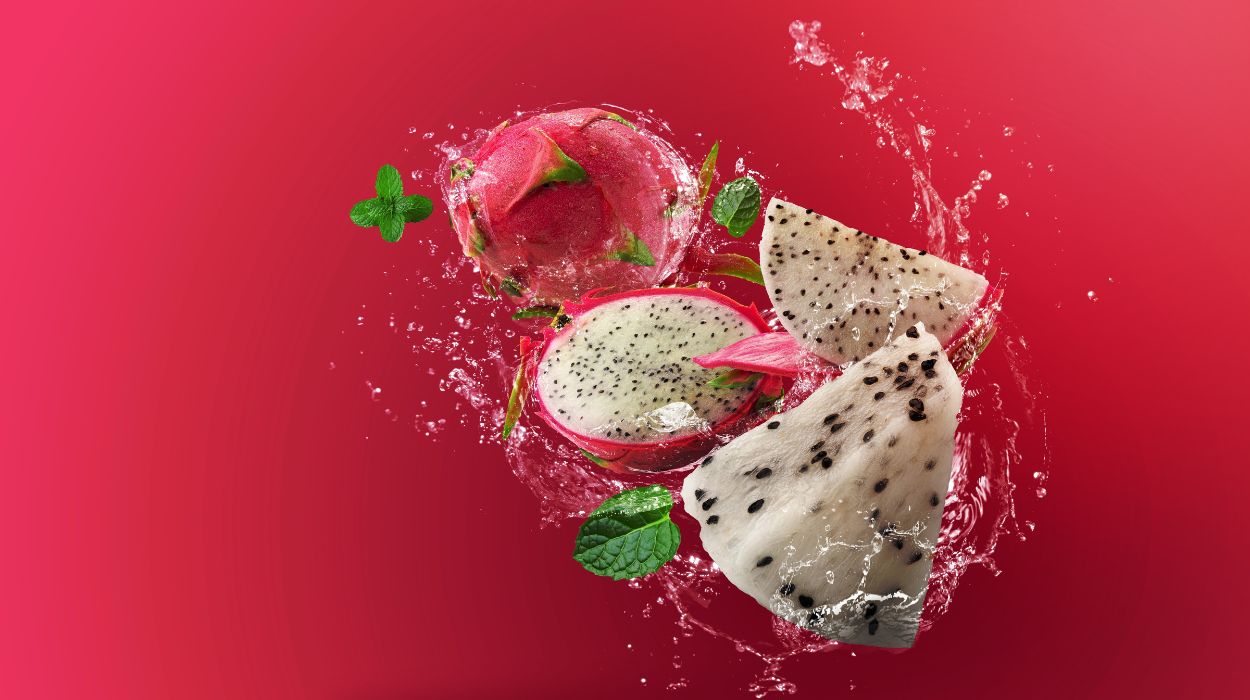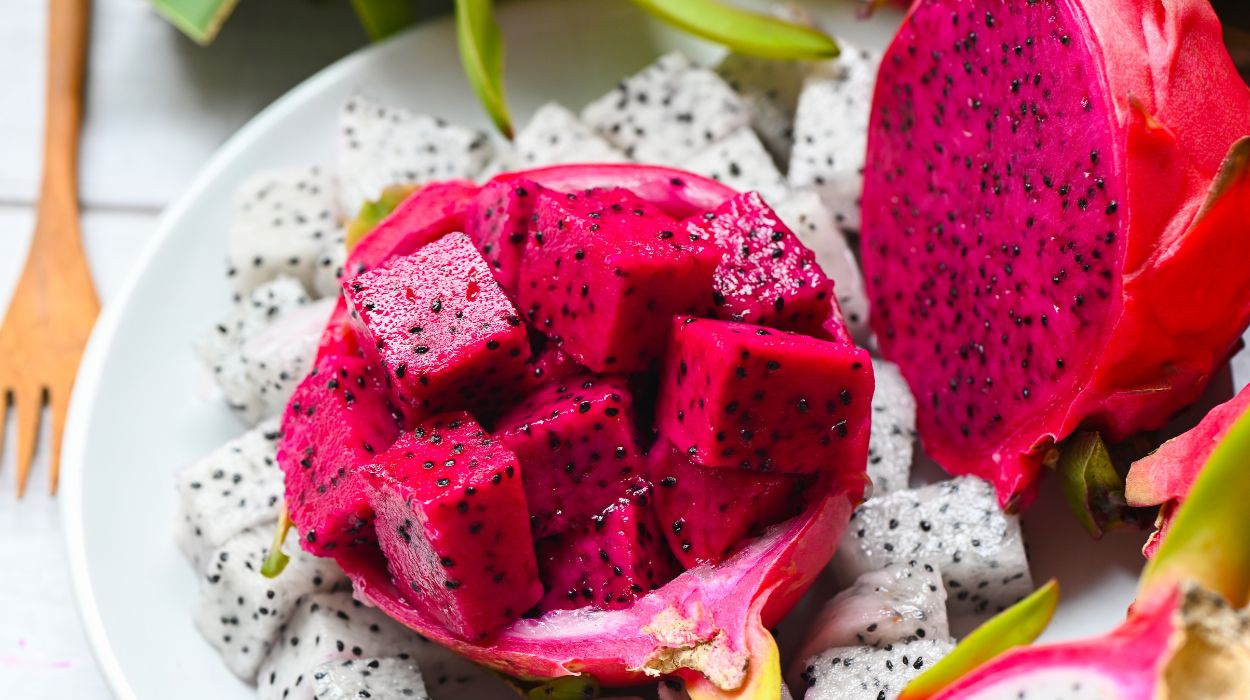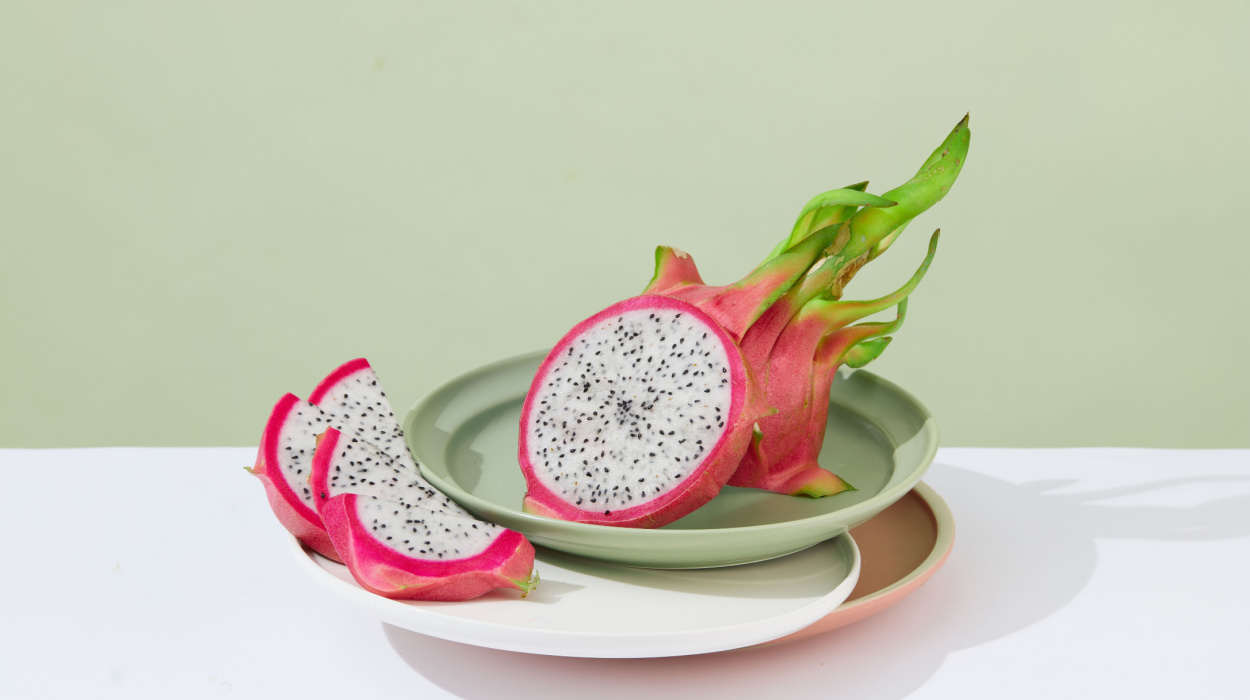Dragon fruit, also called pitaya or strawberry pear, is an antioxidant-rich cactus fruit native to Southern Mexico and parts of Central America. Notable for their deep red skin and delicate flesh, dragon fruit is a popular ingredient in fruit salads and smoothies. However, it’s also one of the most nourishing fruits you can eat and has many potential health benefits.
Dragon fruit is also one of the best fruits for weight loss, thanks to its low-calorie and high-fiber content. So, what are the top dragon fruit benefits, and how can you get more dragon fruit into your diet?
Health Benefits Of Dragon Fruits
- Protection against cancer.
- Reduced risk of diabetes.
- Weight loss benefits.
- Improved immune function.
- Improved digestive health.
- Promotes cardiovascular health.
- Anti-aging benefits.
Health Benefits Of Dragon Fruit

Dragon fruit is well-known for its interesting appearance, but the health benefits of dragon fruit are even more remarkable. This tropical fruit is rich in essential vitamins and minerals that can reduce your risk of serious medical conditions, help you to maintain a healthy weight, and even mitigate the effects of aging.
Protection Against Cancer
One major health benefit of eating dragon fruit is its potential to protect against various types of cancer. Dragon fruit pulp is full of polyphenols,[1] compounds found in plants that have powerful antioxidant benefits. Eating antioxidant-rich foods, like dragon fruit, can help protect your body from the damaging effects of free radicals.
One antioxidant found in dragon fruit is beta-carotene,[2] a red-orange pigment abundant in red, orange, and green fruits and vegetables. Beta-carotene is known to reduce your risk of both cancer and heart disease. Eating red-fleshed dragon fruit, carrots, spinach, broccoli, and tomatoes will help you get more of this antioxidant into your body.
Lycopene is another red pigment and antioxidant compound found in red-fleshed dragon fruit and is known to inhibit the growth[3] of cancer cells. Further studies[4] have confirmed that dragon fruit extract has a cytotoxic effect on tumor cells. As such, it may slow down cancer progression and could one day be used as a form of treatment.
Reduced Risk Of Diabetes
Dragon fruit is a low glycaemic index, or low-GI, fruit meaning it won’t cause spikes in blood sugar. Eating a low-GI diet can help keep your blood glucose levels stable, reducing hunger pangs and aiding weight loss.[5] Therefore, dragon fruit could help those on a weight loss journey shed their excess pounds.
Research has found that eating dragon fruit may also prevent diabetes by reducing blood sugar levels in pre-diabetic patients. In one meta-analysis,[6] pre-diabetic patients who ate dragon fruit experienced a significant reduction in blood sugar compared to those who didn’t.
Without treatment, pre-diabetes can turn into type 2 diabetes within 5 years.[7] Type 2 diabetes puts people at risk of a whole host of other serious health problems, including stroke, heart attack, kidney failure, and the loss of fingers, toes, and legs. Fortunately, pre-diabetes can be reversed[8] with regular exercise and a healthy diet with plenty of low-GI foods, such as dragon fruit.
Weight Loss Benefits
Dragon fruit is low in calories[9] but high in dietary fiber and essential nutrients. Therefore, dragon fruit is an excellent choice of snack for anyone trying to lose weight. Eating dragon fruit won’t contribute too much to your daily calorie intake, and its high fiber content can help to keep you full between meals.
Dragon fruit has a light flavor that has been described as a cross between kiwi and pear. It also has a mildly sweet taste that may help ease sugar cravings, which can be very helpful for people on a calorie-restricted diet.
Improved Immune Function
Dragon fruit is high in vitamin C[10] and, as such, may benefit your immune system. Vitamin C has strong antioxidant properties and supports the functioning[11] of immune cells. Therefore, eating dragon fruit can strengthen your immune system and may help to prevent infections like the common cold.
Improved Digestive Health
Dragon fruit contains a type of carbohydrate called oligosaccharides,[12] which are thought to benefit digestive health. Dragon fruit oligosaccharides function as a prebiotic,[13] meaning they promote the growth of healthy bacteria in the gut. Research suggests that eating dragon fruit may, therefore, help to balance the population of bacteria in your intestines known as the gut microbiota.
Having a healthy gut microbiota is key for promoting healthy digestion and can help ease stomach problems[14] like diarrhea and constipation. It also helps to restrict the growth of ‘bad’ bacteria that can increase your risk[15] of diseases like inflammatory bowel disease and cancer.
Dragon fruit also has a high fiber content, which is key for regulating the gut microbiota[16] and promoting gut health. Eating plenty of dietary fiber can keep your digestive system functioning properly. It may also reduce your risk[17] of obesity and obesity-related diseases, such as type 2 diabetes.
Promotes Cardiovascular Health
Pink-fleshed dragon fruit is rich in natural, red-colored pigments called betalains. Betalains are great for heart health, as research suggests[18] they may improve the function of your blood vessels and ease arterial stiffness.
Arteries are the major blood vessels that carry oxygenated blood from your heart to every cell in your body. Arterial stiffness is a loss of flexibility in the walls of the arteries caused by[19] aging, obesity, metabolic diseases, poor quality sleep, and poor cardiovascular health.
Over time, arterial stiffness can lead to other serious health problems such as heart failure, stroke, kidney disease, high blood pressure, and brain aneurysms.
Including dragon fruit in your diet can improve your cardiovascular health and reduce your risk of illnesses caused by a lack of healthy blood flow. More heart-healthy foods include other fruits, green leafy vegetables, whole grains, beans, nuts, and fatty fish.
Anti-Aging Benefits
Besides being good for your medical health, dragon fruit also has anti-aging properties that can promote skin health. Dragon fruit is a rich source of vitamin C and other antioxidants, which can help to reduce skin damage[20] caused by sun exposure. Eating plenty of dragon fruit and other fresh fruits and vegetables may, therefore, help to mitigate the aging process and improve the long-term appearance of your skin.
Skin creams containing dragon fruit extract are also thought to slow down melanin synthesis,[21] which is the leading cause of dark spots associated with premature aging. It might also stimulate collagen production, making your skin firmer and more elastic and help to maintain a youthful appearance.
What Is A Dragon Fruit?

Dragon fruit is a tropical fruit that grows on cactuses native to[22] Southern Mexico and Central America. Nowadays, you can find dragon fruit in tropical regions worldwide, including Southeast Asia, East Asia, the Caribbean, Southern parts of the United States, and Australia.
There are many different species of dragon fruit, but the most common types are yellow dragon fruit, red dragon fruit with white flesh, and red dragon fruit with red flesh.
All dragon fruit varieties have a vibrant skin covered with wing or scale-like structures called bracts. Cutting through the skin reveals a soft white or red flesh dotted with edible black seeds. Most dragon fruits, both red and yellow-skinned, have white flesh; only one variety – Hylocereus costaricensis – has bright red flesh.
Nutritional Value Of Dragon Fruit
One whole dragon fruit contains just 43 calories,[23] making it a popular option for people on a weight loss diet. Dragon fruit is also low in sugar compared to many other tropical fruits, with 7.31 grams per fruit. Each fruit also contains 2.32 grams of fiber.
Dragon fruit is high in essential vitamins and minerals, including calcium, iron, magnesium, phosphorous, potassium, folate, choline, and vitamins C, E, and K. It is also a rich source of beta-carotene, a red-orange pigment with powerful antioxidant effects.
Possible Side Effects
Generally, dragon fruit is perfectly safe to eat. Many people eat dragon fruit every day with no issues and may enjoy better long-term health as a result. However, dragon fruit contains a few proteins that may cause allergic reactions[24] in some people.
Allergic symptoms[24] caused by dragon fruit may include vomiting, hives, and tongue swelling. In severe cases, dragon fruit can cause anaphylaxis, a rapid and potentially deadly allergic response. Symptoms of anaphylaxis include a fast heartbeat, difficulty breathing, and faintness.
If you have a history of food allergies or anaphylactic reactions, you may be at higher risk of dragon fruit allergy.
Besides, if you try to eat dragon fruit for the first time, you can start with a small amount to see your body’s reaction and increase portion size step by step. It is a general rule for those who want to stay safe while introducing new foods to their body.
How To Eat Dragon Fruits
Fresh dragon fruit has a delicate, mildly sweet flavor that can be compared to a cross between kiwi and pear. Ripe dragon fruit can be eaten just as it is; simply cut the fruit in half and scoop out the flesh. The tiny black seeds in dragon fruit are also edible, so there’s no need to pick these out.
Dragon fruit can also be added to fruit salads or whizzed into smoothies. The slightly sweet taste of dragon fruit pairs well with other tropical fruits, like mango or pineapple. However, it can also be used to add a dash of sweetness to savory salads.
Due to its various health benefits, dragon fruit powder has become one of the ingredients of fruit and vegetable supplements or green powders. These supplements may contain a hearty dose of antioxidants, many of which are naturally found in dragon fruit.
However, you should always ask your doctor first before starting any supplement, vitamin, or herbal product to be sure about your body’s needs and potential side effects.
Conclusion
The health benefits of eating dragon fruit are well known, as this tropical fruit is rich in vitamins, minerals, and antioxidants. Dragon fruit is a pack of vitamins, minerals, and bioactive compounds to fight cancer, improve cardiovascular health, promote healthy digestion, and reduce your risk of diabetes. It also promotes skin health, boosts immune function, and may aid weight loss.
A balanced diet full of fresh fruits and vegetables is a cornerstone of a healthy lifestyle. If you’re eating healthy, add dragon fruit to your diet to significantly increase your intake of nutrients and antioxidants.
Frequently Asked Questions
Dragon fruit has many medicinal properties that benefit the health of your immune system, heart, and digestive system. Its antioxidant, anti-inflammatory and prebiotic properties may also reduce your risk of serious medical conditions such as cancer, heart disease, and diabetes.
Dragon fruit is good for many of your vital organs and organ systems but is especially beneficial for your heart and gut. It contains dietary fiber and key nutrients that can improve both your cardiovascular and digestive health.
Dragon fruit is a rich source of antioxidants, which neutralize free radicals in your body. This prevents them from causing damage to your DNA and may reduce your risk of cancer and fight skin aging.
For most people, dragon fruit is completely safe to eat every day. The exception is people with food allergies, as dragon fruit contains proteins that can trigger allergic reactions in some individuals.
Dragon fruit is considered a superfood due to its rich content of vitamins, minerals, and antioxidants. It is known to have many health properties and protects against cancer, diabetes, heart failure, and more.
The pros of dragon fruit are its powerful health benefits. Eating dragon fruit can help to protect you from a wide range of serious medical conditions. The only downside to eating dragon fruit is the potential for allergic reactions.
 Evidence Based
Evidence Based
